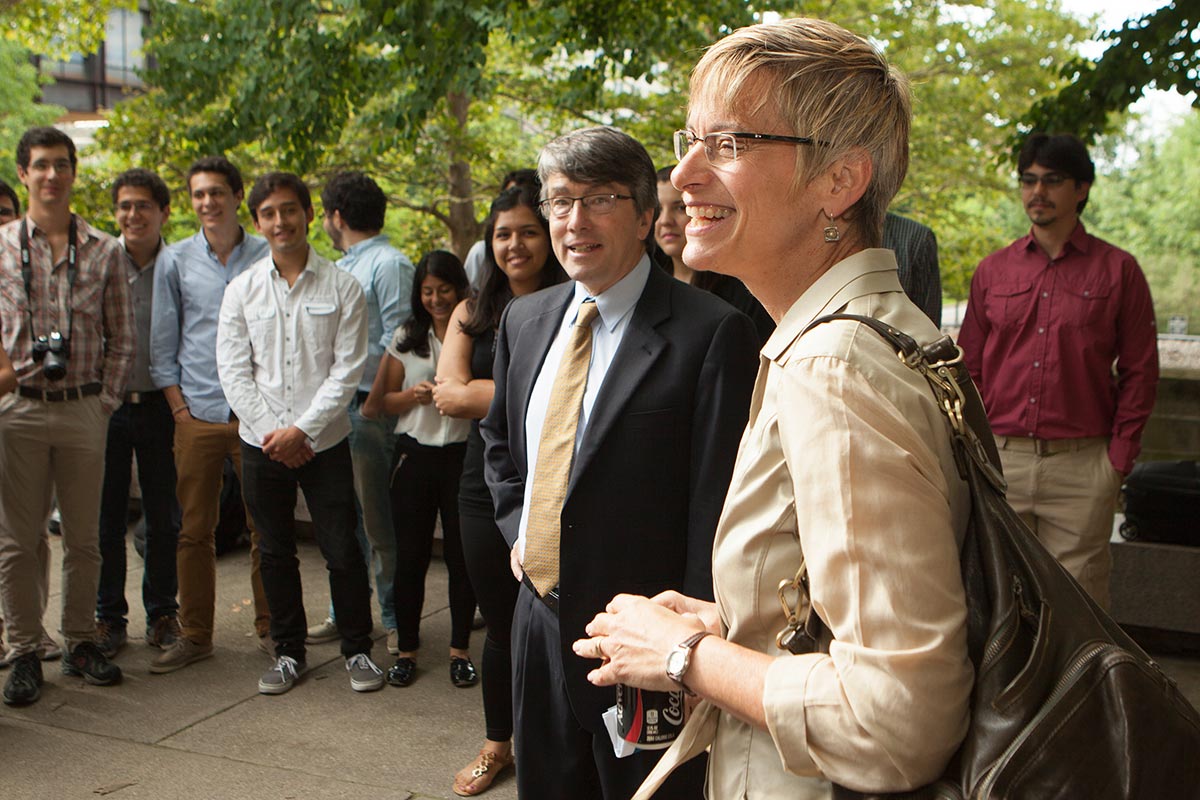37 Latin American students jump into summer research
By Daniel Aloi

Oscar Castañeda is a fifth-year engineering student at Universidad del Valle de Guatemala, where he says, “The closest thing to research experience is your thesis.”
“In my course in electrical engineering, we don’t have a graduate program,” he added. “If you want to go on, you have to study abroad.”
Castañeda, 22, is at Cornell this summer as part of CienciAmerica, an eight-week program teaming 37 students from Latin America with research faculty. He is working in the Computer Systems Laboratory with assistant professor Christoph Studer, developing an algorithm for data detection in wireless systems.
“It’s great. I have a lot of support from my professor, and he’s always available,” Castañeda said.
“Every single person we have this year is thrilled with the things they are working on,” said CienciAmerica director Timothy DeVoogd, professor of psychology in the College of Arts and Sciences and director of the Latin American Studies Program. “We get very, very bright students, some of whom we will recruit here for Ph.D.s.”
In matching up students with research faculty, “we get a statement and their transcripts, and we see what their interests are,” CienciAmerica associate director Julie Simmons-Lynch said. “We try not to just place them within their major, because they can do that at their own school. The fun is in putting students together with like-minded professors.”
Andres Vargas Sanchez, 22, a physics major from Barranquilla, Colombia, is doing theoretical research on neutron stars with professor of astronomy and physics Ira Wasserman.
“I find Cornell really interesting. It’s amazing to see what knowledge can construct,” he said. “I’d like to continue talking to Ira; it’s really fun to work with him. I’m proud to be studying here, as I am proud of my own university in how they planned to invest in us.”
Cornell is hosting 28 students (including Sanchez) from Universidad de los Andes in Bogotá, Colombia, seven from Venezuela, and one each from Cuba and Guatemala.
“We believe Maydel Fernandez is the first Cuban student in 50 years to come to the U.S. for such a program,” Simmons-Lynch said.
Fernandez believes so, too. At the Miami airport, she said, U.S. Customs officials told her they had never seen a Cuban student visa before.
She was placed in the laboratory of David Field, professor of psychology, to study visual perception using newly developed virtual reality technology.
“This basic research is really fascinating,” she said. “We’re helping to find out how useful this tool will be. I think I would love to pursue this more.”
Fernandez, 22, works at the Cuban Neurosciences Center and recently completed undergraduate studies in psychology and cognitive neuroscience at the University of Havana.
She said she will bring some of the equipment with her “back to Cuba and continue the research.”
Colombian biology/geoscience major Laura Vanesa Rodríguez, 20, was paired with neurobiology and behavior researcher Maren Vitousek, studying tree swallows for physiological responses to environmental stressors, such as climate’s effect on reproduction.
“I decided to work with birds for my thesis,” she said. “I was speaking with [ornithologist] David Winkler in my lab, and I asked him to be one of my mentors.”
She added: “Before I came here, I was worried, thinking that American people are really rough. Working with a really great team changed my perspective on that.”
CienciAmerica is aligned with President Barack Obama’s 100,000 Strong in the Americas initiative, which aims to increase international study and student exchange between the United States, Latin America and the Caribbean.
In 2014, Cornell hosted 23 students from Mexico for six weeks. This year, the 28 Colombian students received financial support from their university; the others are supported by the U.S. embassies in their countries.
“I wrote to all the embassies in the region back in April, and three came up with money to support students,” DeVoogd said. “The others asked me to write back later and said they will try to participate next year. I would be pleased to have someone from every country in Latin America next year.”
Media Contact
Get Cornell news delivered right to your inbox.
Subscribe